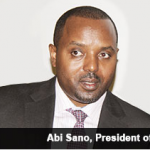 The former president, a founding member of the bank, resigned over a dispute linked to the sacking of three employees
The former president, a founding member of the bank, resigned over a dispute linked to the sacking of three employees
Regulators at the National Bank of Ethiopia (NBE) have accepted the nomination of Wondwesen Teshome, former president of the state-owned Development Bank of Ethiopia (DBE), to serve as president of the youngest private commercial bank, Enat Bank S.C.
Wondwesen’s nomination as the second president of Enat – which means mother – was accepted last week. Regulators at the Central Bank communicated their approval to the Board, on Thursday, January 23, 2012.
The post of president at Enat – which opened its doors as the country’s 16th private bank on March 5, 2013, with a subscribed capital of 260 million Br and 120 million Br in paid up capital -has stayed vacant since late September, 2013.
Fasika Kebede, Enat’s founding president, filed her resignation letter in late September, prompted by the Board’s decision to put her on forced leave. This followed a dispute over the resignation of three top-level employees – a finance manager, a branch operations manager and a human resources director.
The three resigned after disagreements with the former president escalated, but the Board intervened to request their reinstatement. Fasika, however, refused to do so, which led to her suspension.
Enat, which has been delivering services in three branches, expects to welcome Teshome next week, according to Birtukan Gebregzi, who was appointed as acting president on September 26, 2013.
The Board of Directors has been looking for a female president since late September.
Finding a new president, however, proved to be a challenge for the Bank, which prides itself on having female leadership. This is in line with its vision of becoming a “world class bank mainly by leveraging women’s capabilities.”
But it was because of this vision that Enat was hard-pressed when it was established, after Regulators had rejected two of its initial female candidates for president.
Their first choice was Birtukan, who previously worked as the manager of international banking at the Bank of Abyssinia (BoA). The NBE rejected the selection due to concerns over what it perceived as her lack of experience in credit mobilisation, forcing the Bank to search for other candidates.
The next candidate, Brutawit Abdi, also faced rejection, despite her status as a veteran in Ethiopia’s private banking industry, serving at the helm of the Wegagen and Zemen banks. This rejection was due to issues related to her resignation from the latter bank.
It was third time lucky, when Fasika, an economics graduate from Addis Abeba University (AAU) in 1981, received the NBE’s approval.
The difficulty of finding a female president prevailed again, forcing the Bank to swing around and settle for a male president.
“That was because we could not find the kind of qualified and competent female president we were looking for,” Birtukan told Fortune.
The Board of Enat nominated Wondwesen after being convinced of his capability to effectively carry out the Bank’s declared mission of empowering women in business, says Birtukan, who was also one of the founding members of the youngest entrant into the banking industry, with 64pc of its 253 million Br subscribed capital held by women.
Wondwesen received a bachelor’s degree in accounting from the AAU. Then he got his master’s degree in business administration, majoring in international business, from the University of Greenwich in London.
After working for three decades in banking, he moved on to the development sector and served as the president of the DBE between February 2006 and January 2009.
“For me it is like returning to where I belong,” Wondwesen told Fortune. “It is the industry I like and want to serve even more.”
Enat barely survived the Central Bank’s decision in September 2011 that put up the threshold capital to form a commercial bank to half a billion Birr. More than 5,000 shareholders of the Bank chipped in the 160 million Br in paid up capital when public offers were closed in February 2012.
“I understand the challenges faced by the private banks,” Wondwesen said. “But I am optimistic about the future path to be followed by Enat.”
His first plan is to go through the Bank’s strategic plan and evaluate it, he said.
“Unless we follow the business wisely, it is very difficult to stay in the sector,” he said. “However, we are very ready to face any challenges in the sector, whether it is policy or any other type of competition.”
BY YONAS MULATU
FORTUNE STAFF WRITER.

























![Ethiopia’s Nile dam project signals its intention to become an African power [The Guardian] Ethiopia’s Nile dam project signals its intention to become an African power [The Guardian]](https://www.ethiopianopinion.com/wp-content/plugins/top-10/timthumb/timthumb.php?src=http%3A%2F%2Fwww.ethiopianopinion.com%2Fwp-content%2Fuploads%2F2014%2F07%2F562a6dfb-150x150.jpg&w=&h=&zc=1&q=75)


Join Conversations